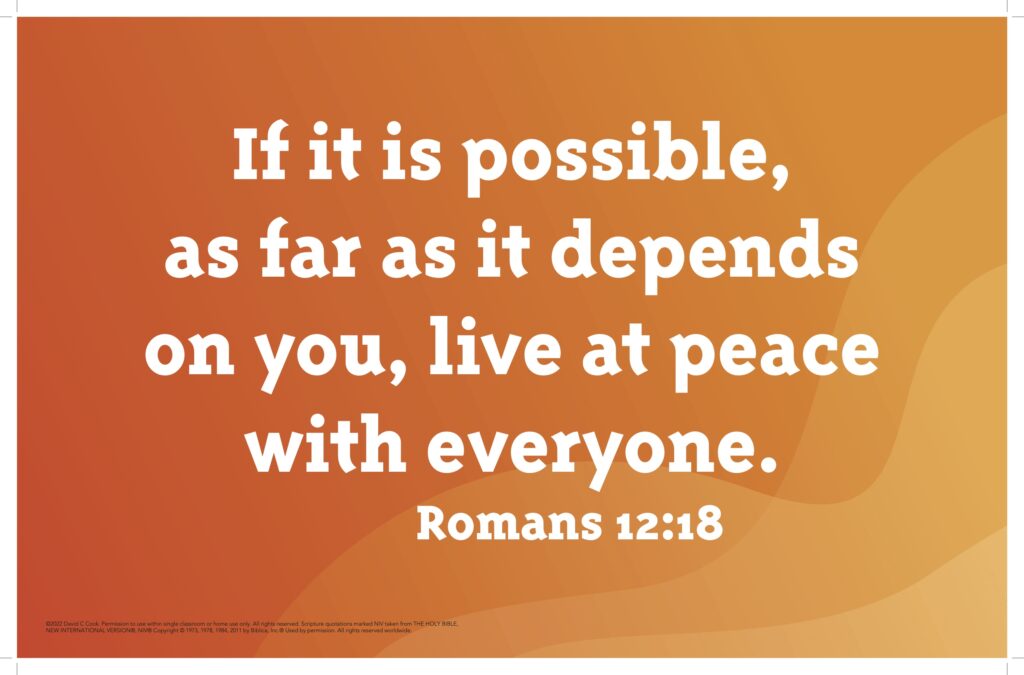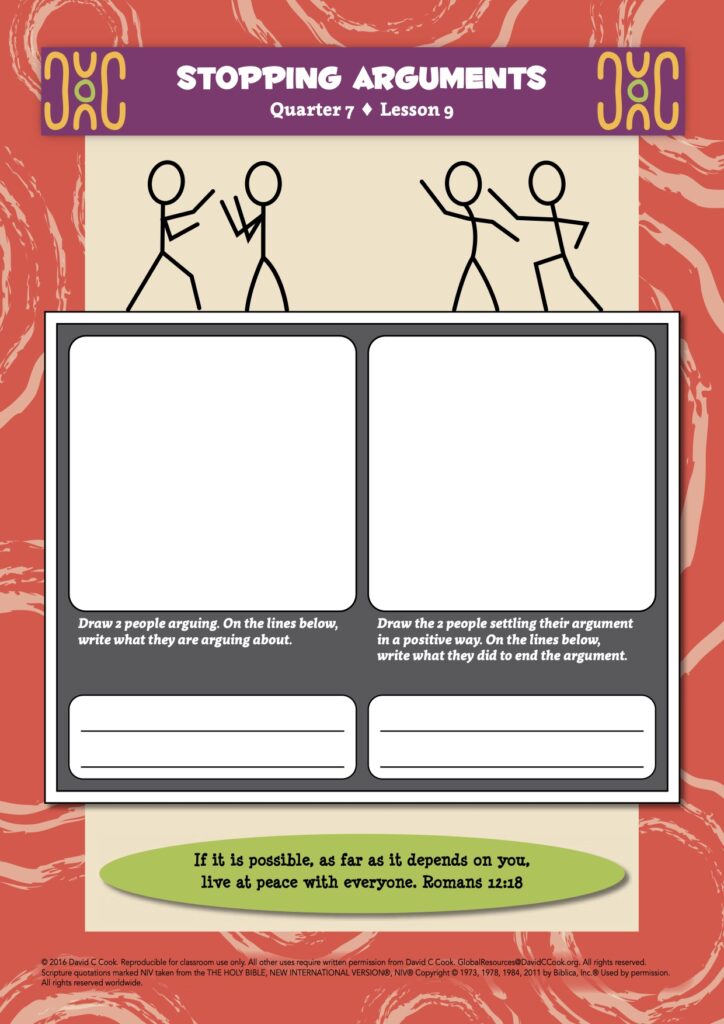During the lesson, the information for you to know is written in regular type, and what we suggest speaking or reading aloud to children is in bold. All resources for this lesson, including the Teacher Guide, Student Page, Family Connection Card, and other resources can be downloaded in a ZIP file by clicking on the following link:
In some lessons you will find "resource articles." These are articles written by experts from around the world to help equip you for your work with children and adolescents. Share them with parents or guardians if you consider it appropriate.
Then they cried out to the Lord in their trouble, and he brought them out of their distress. He stilled the storm to a whisper; the waves of the sea were hushed. They were glad when it grew calm, and he guided them to their desired haven.
Psalm 107:28–30
Disagreements and arguments with those around us can make us feel as though we are tossed about in a stormy sea. They can cause anger, anxiety, and deep wounds. When you are in an argument with someone, reconciling may not be your natural reaction. God, who stills storms and hushes waves, wants to replace your anger with His calm. He desires for us to live at peace with all men, as much as it depends on us (Romans 12:18).
It is true that God wants us to reconcile when we have had an argument. But how do we do that? If someone provokes you into an argument this week, do not respond immediately. Instead, count to 10. Take a few deep breaths. And pray! Ask God to produce in you the fruit of His presence—love, joy, peace, patience, kindness, goodness, faithfulness, gentleness, and self-control (Galatians 5:22–23). Ask Him to help you learn how to reconcile after arguments.
Let your children’s families know that their children will learn positive ways to settle arguments. Encourage the families to discuss these 4 positive ways to handle arguments: 1. Count to 10. 2. Remain calm. 3. Decide to talk when you are both calm. 4. Apologize. Which ones have they tried in the past? Which do they find most helpful? Do they have other ideas that help?
Teacher Tip: If possible, email or text the Family Connection Card to the families of your students.
Greet your students warmly as they arrive.
Everyone has disagreements with others. How can we reconcile with someone who has made us angry or hurt us? Today we will talk about how to settle arguments in healthy, positive ways.
Listen to this Bible verse about disagreements and being angry.
Read Ephesians 4:26 from your Bible. It is also printed here:
“In your anger do not sin”: Do not let the sun go down while you are still angry.
Ephesians 4:26
This verse tells us that it is okay when people disagree and get angry, as long as their anger does not cause them to sin. I know I have argued with my family and friends, and I think you have, too. Today, we will learn how to argue and disagree in right ways. But first, we will
explore how we feel when we see people arguing or when we are arguing with others.
Please sit in a circle.
Sit in a tight circle with the children. Tell them that you will pass a stone around the circle, and whoever has the stone will share.
Think about a time when you saw 2 people you know arguing. Think about how you felt when they were quarrelling. We will go around the circle and everyone will say a sentence. The sentence begins with “When I saw someone arguing, I felt ________ because ______ .” I will go first. “When I saw 2 of my friends arguing, I felt frustrated because I could not think of how to help them.”
Pass the stone to the child to your right. Each child will complete the sentence and pass the stone to the right. It is okay if some children repeat what others have said. When the stone comes back to you, pause for the next part.
Now think about a time when you had an argument with someone. We will go around the circle again and each person will say a sentence. This time the sentence will say this: “When I argued with the person I am thinking about, I felt ________.” We will not say anyone’s names. I will go first. “When I had an argument with the person I am thinking about, I felt sad.”
After you make your sentence, pass the stone to the child on your left. Each will child say the sentence and pass the stone. Again, it is okay if some children repeat what others have said. When all the children have shared, ask them to call out “feeling words” that were used during the activity, such as angry, scared, sad, etc.
Arguing stirs up many different feelings. Some are feelings about yourself and some are feelings about the person with whom you are arguing. When we have strong feelings, we might say or do things that are hurtful or wrong. When we do that, we may feel bad, ashamed, or sad afterward. Today we will learn good ways to handle these situations.
Let’s find out what God says about arguing.
Read Proverbs 15:18 from your Bible.
A hot-tempered person stirs up dissension, but who is patient calms a quarrel.
Proverbs 15:18
If needed, explain that someone who is “hot-tempered” gets angry quickly and easily.
That person calms a quarrel. Help the children see that staying calm instead of getting angry can help settle arguments.
Listen to another verse that helps us know how God wants us to deal with arguments.
Don’t have anything to do with foolish and stupid arguments, because you know they produce quarrels.
2 Timothy 2:23
Listen to a short story I will tell you about 2 boys. You will each get to decide how these boys will respond.
Louis and Daniel walked into the science classroom while having a friendly conversation. They were the first students in the room, and the teacher had not yet arrived. They were excited to see a new piece of equipment, a microscope. It was the first microscope the school had ever had. Both of them wanted to use it first. They started to argue, and ended up fighting over who would go first. Louis called Daniel a mean name. Then Daniel pushed Louis to the ground. They continued to argue loudly until the teacher walked in and told them to stop.
How would you complete the sentence,
Let the children share their thoughts.
Allow 3–4 children to respond.
When you have an argument, it is good to apologize and then do something to show you feel bad about what you did or said. It is hard to stay angry with someone who is trying to do the right thing, even after an argument or a fight.
Pair up with someone sitting next to you. Tell each other about a time when someone apologized for hurting you or offending you. How did that make you feel?
Have a story of your own ready to share if necessary.
Explain to the children that you will give them 4 tips to stop an argument. After you say each tip, pause for a moment for the children to shout it out loud. Then continue with the explanation of each one.
The first thing you should do is pray. Christians should always ask God for help whenever they have problems. You can ask Him for wisdom on how to handle the situation. You can also ask Him for a peaceful heart. There are some other things you can do which often help.
Listen to what Romans 12:18 says about this:
Show the memory verse poster if you are using it.
If it is possible, as far as it depends on you, live at peace with everyone. Romans 12:18

Let 2–3 children give their thoughts. If you need to, help the children understand that they are only responsible for their own actions and responses. If they try to reconcile with someone who refuses, they have done what they could and they should not feel bad.
Ask the children to shout out the 4 tips: count to 10, take deep breaths, talk later, apologize.
It is always important to apologize when you have upset someone. It is also important to show the other person that you feel bad for what you did or said.
The children may come up with responses such as these: spend time with the person; help the other person with something; play with the other person; share something with the other person; tell the other person, “I will not do it again.”
These are all good ideas. Let me add 1 more. You should act normally around the person so she will know that you are not still angry and looking for a reason to get even with her.
Ask the children to get in pairs. Explain that you will read 3 situations. After each one, the children will talk with their partners about positive ways to stop the argument. Allow 3 pairs to share with the whole class after each situation.
Arguing or fighting is common. It is important to work hard to settle your differences and stop the arguments. If you are not sure how to handle a situation, ask me or another Christian leader or a friend for advice.
Optional: If you are using Student Pages, there is space for children to draw and write about an argument and positive ways to settle it.

Indira Gandhi, who was a great leader in India, said, “You cannot shake hands with a clenched fist.” Go ahead and try it!
Encourage all the children to try this with their partners. The handshake just does not work! Explain that Indira Gandhi was saying that when our fists are clenched, we are ready for a fight. When we stop making a fist, we can shake hands with the other person and tell him that we are sorry.
Point out that God wants those who love Him to get along and not to fight. But when they do fight or argue, He wants them to apologize to each other. He wants them to forgive each other.
Explain that you will slowly count to 25. Each time you say a number each child is to shake someone else’s hand and say, “I do not want to fight with you.” When you reach 25, stop. Then pray this blessing based on Romans 12:18 over the children:
Blessing: Our God is the God of love and peace. May He help you to live in peace with everyone, as much as it depends on you.
Lead the children in singing this quarter’s song, if possible.
Life on Life ©2020 David C Cook. Reproducible for home or classroom use only. All other uses require written permission from David C Cook [email protected]. All rights reserved.